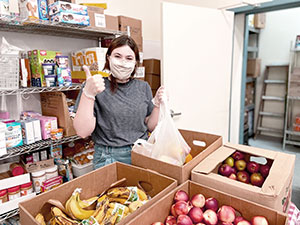
Local organizations such as Project Soup are helping to provide food for those in need throughout the city.
By Eileen Qiu
Somerville has an estimated SNAP gap of 53 percent. Around 700 individuals in Somerville likely eligible for the Supplemental Nutrition Assistance Program are unenrolled according to 2020 statistics from the MA Department of Transitional Assistance.
Food insecurity, instigated by rising costs and the COVID-19 pandemic increased by 55 percent from 2019 to 2020, with Latinx and Black residents disproportionately affected according to a survey conducted by the Greater Boston Food Bank.
Language barriers, location, transportation and financial hardship may plague families facing food insecurity according to Jessie Alvira, resident services coordinator at the Claredon Hill Towers.
People who didn’t have a need for food banks or supplemental programs prior to the pandemic may feel that they’ll recover despite all odds, without realizing how long it could take. There could also be shame associated with experiencing new struggles, according to Alvira.
Community Action Agency of Somerville offices are closed due to the pandemic, but Ashely Tienken, Director of the Housing Assisting Program, said HAP’s benefits specialist will assist households facing food insecurity by applying for SNAP benefits if eligible or refer them to a food pantry if there is hesitation around applying for SNAP.
“Clients can’t walk in to inquire about services and no in person meetings are being held, but we are still fully open in the sense of all staff are working,” Tienken said.
The culture surrounding undocumented households from seeking benefits have prevented families from applying to food stamps as well, she said.
The public charge rule, no longer in effect now, also contributed to dissuading some households from seeking help.
When a household is facing food insecurity but doesn’t want to apply for SNAP benefits due to immigration status or other reasons, then Market Basket gift cards are available in the offices as well. However, it isn’t enough to sustain a family of four for more than 2-3 weeks.
“There is always a greater need,” Tienken said. “It is always very limited and it is contingent on funding,”
Tienken thought of what the impact for families with children who have to remain at home due to COVID-19 exposure after her own child had to quarantine due to possible exposure. She was fortunate enough to be able to take time off work to care for her child, but someone less fortunate might not have the luxury.
“If your child is home for seven days, you are likely losing work and you are likely needing to pay more for groceries at home because you are missing out on free lunches and breakfasts at school,” she said.
Somerville continues to work with Project Soup, a food delivery program for people who are in quarantine and at risk of running out of food, Lisa Robinson, Director of Shape Up Somerville said. Local pantries continue to drive food to households who are quarantining as well.
“It was all hands on deck early in the pandemic and so many of our care and school providers and liaisons were helping with this effort,” Robinson said.
Project Bread offers a food source hotline available in 160 languages. People may also call 311 to be connected to food resources.















Reader Comments